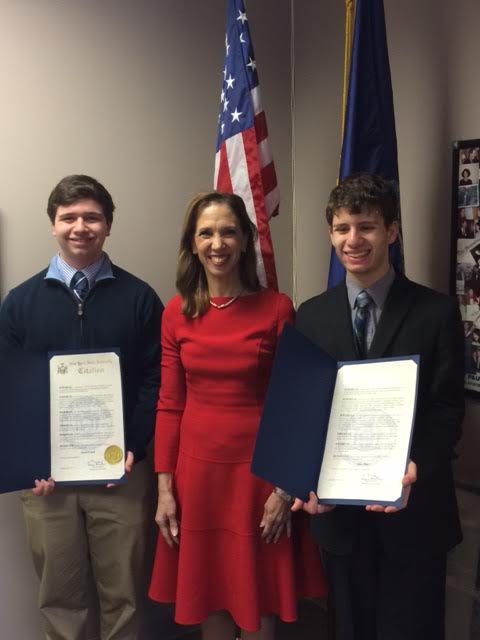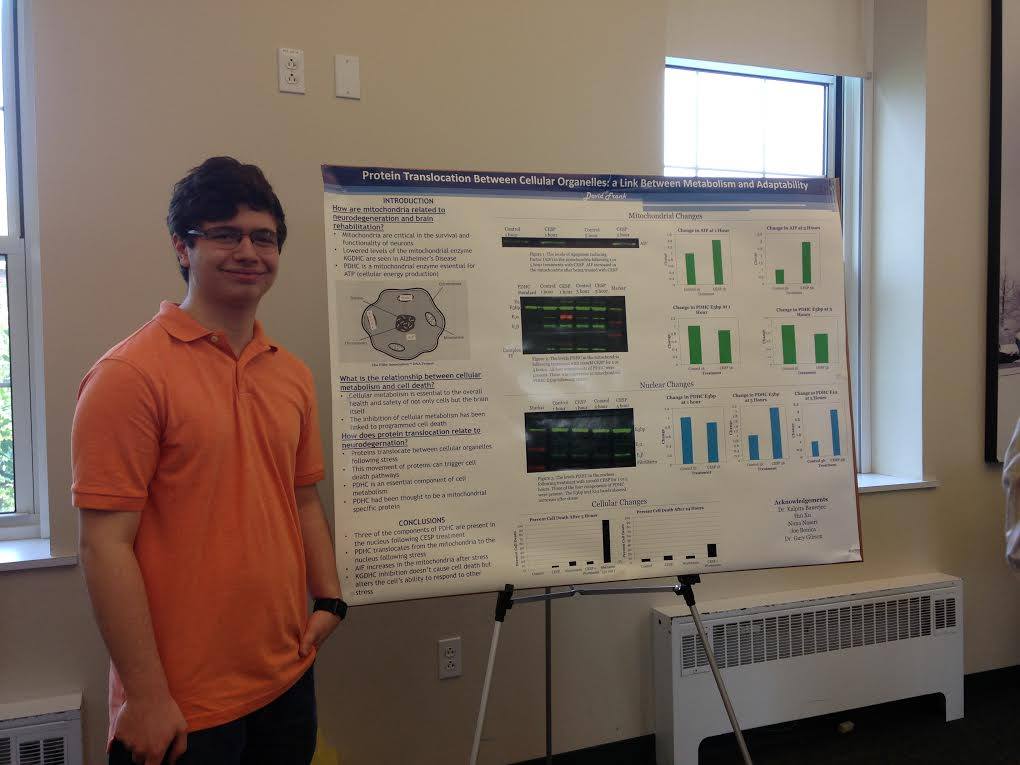Meet Intel Semifinalist David Frank
- Category: Schools
- Published: Monday, 02 February 2015 16:02
- Joanne Wallenstein
 Scarsdale High School Senior David Frank has been named a semi-finalist in the Intel Talent Search for his work on Alzheimer's Disease. He is a student in the science research program at SHS, headed up by science teacher Beth Schoenbrun and spent countless hours working in a lab at the Burke Medical Research Institute under the direction of Dr. Gary Gibson. Among other honors, Frank was invited to State Assemblywoman Amy Paulin's office to receive a certificate of achievement. He is pictured here on the left with Paulin and Max Pine of Pelham who was named an Intel finalist.
Scarsdale High School Senior David Frank has been named a semi-finalist in the Intel Talent Search for his work on Alzheimer's Disease. He is a student in the science research program at SHS, headed up by science teacher Beth Schoenbrun and spent countless hours working in a lab at the Burke Medical Research Institute under the direction of Dr. Gary Gibson. Among other honors, Frank was invited to State Assemblywoman Amy Paulin's office to receive a certificate of achievement. He is pictured here on the left with Paulin and Max Pine of Pelham who was named an Intel finalist.
We asked Frank to answer a few questions about his work and the experience and here is what he shared:
Tell us about your research:
In Alzheimer's Disease it has been noted that there is a decrease in an enzyme involved in the production of ATP (celluar energy) called the α-ketoglutarate dyhydrogenase complex (KGDHC). What this means is that these neurons with low levels of KGDHC are selectively vulnerable or are more prone to cellular and metabolic stress. What I was looking at was what changes in cell signaling were causing the cells to be more vulnerable to stress. I looked at a different mitochondrial enzyme complex called the pyruvate dehydrogenase complex (PDHC). I observed this enzyme complex because it had been shown to translocate from the mitochondria to the nucleus. The importance of mitochondrial nuclear signaling is that it is a stress response that can alter the genome and therefore cellular function. This study mimicked the metabolic changes seen in Alzheimer's Disease to see what is happening in the cells when KGDHC is diminished. I saw that as KGDHC was inhibited, PDHC translocated from the mitochondria to the nucleus which indicated a type of cell signaling. What was also important is that there was no cell death which shows that this movement of PDHC was causing other changes in the cell. When PDHC is in the nucleus it can turn on and off certain genes and because of this, we are attributing the selective vulnerability of neurons to the translocation of PDHC from the mitochondria to the nucleus.
In whose lab did you work -– for how long?
I worked in Dr. Gary Gibson's Lab at the Burke Medical Research Institute in White Plains. I've worked there since June 2013. During the summers I worked from 9 - 4:30, 5 days a week and during the school year I work around 4 hours each week. The specific project I did was done over 8 weeks this past summer.
How did you meet your mentor?
I emailed many scientists in the area and eventually got a response from Dr. Marc Tessier-Lavigne, who unbeknownst to me was the President of Rockefeller University. He put me in contact with Dr. Raj Ratan the head of Burke and from there I was referred to Dr. Gibson who became my mentor.
How did you become interested in the subject area?
I was originally intrigued by traumatic brain injuries and concussions in football. I did some research on the topic and looked at the available research opportunities that I could be involved in. After thinking about what I wanted to research in more detail I concluded that rather than look at brains and the damage caused by neurodegeneration and trauma, I would look at what is causing neurodegeneration at the cellular level. My mentor Dr. Gibson looks at the mitochondria and how it relates to neurodegeneration. I took on that research goal as well. Even though my research is more on the cellular pathways and Alzheimer's disease, my desire to do brain research came from my love of sports and my interest in head injury.
What is involved in applying for the Intel award?
There is a research paper you write about the work you have completed in your lab. In addition to the paper, you fill out an entire application, complete with questions, supplemental essays, teacher recommendations, and transcripts. It was like doing another college application.
Do you plan to pursue science research in college?
I am planning on doing engineering in college, but I am still interested in doing research. I have loved working at a lab and have cherished every moment of it. I am currently not sure what I want to study but I do want to continue doing some form of research. Not only have I learned a lot about science, I have also had the pleasure of meeting and interacting with some incredible people. I also learned what its like to be in a real work environment, which is something you do not learn at school.
What has it been like for you since the announcement was made? Have you been busy doing interviews? Making appearances?
It has been a little hectic. I've been busy at school and then you add in people congratulating me and talking to me about my research. It has been fun and it is really amazing to have people interested in the work I've done.
What do you win and what do you plan to do with the proceeds?
I won $1000. I haven't decided what I want to do with my money yet, but I'll probably spend it on something like sports tickets, which are never that cheap here in New York.














